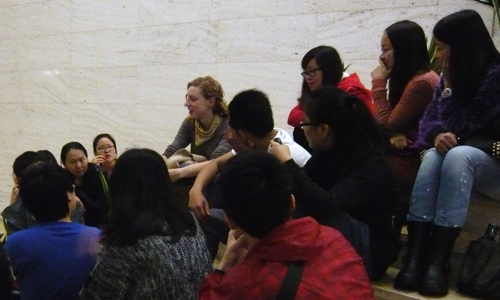By WU Qianwen
The English Corner was held in the library on April 10th, and tonight’s topic was Superstition. Ms. Sarah Tillman, Mr. Sean McHugh, Mr. Chris Dockstader, Mr. Charles Brian Harrison and Ms. Linda Jean Visner attended this activity.
Folk belief is a vital part of traditional culture in a country. Superstition becomes a kind of cultural power, which has existed for hundreds of years. In the English Corner, the foreign teachers introduced some concepts of superstition and their origins in the west. Mr. Sean McHugh told the students that most superstitions were related to religions. One of the most widespread superstitions was that thirteen is regarded as an unlucky number. Therefore, generally many hotels do not have a room of number thirteen. Some people will not start a trip on the 13th day of a month, especially when it is also a Friday. “Friday has long been regarded as an unlucky day, because they believe that Jesus Christ was put to death on the cross on Friday”, Mr. Sean McHugh continued. When it came to the behaviors supposed to be unlucky, Ms. Sarah Tillman said that breaking a mirror was one of the most common superstitions, for it meant bringing death or seven years of bad luck. And other common superstitions include opening an umbrella indoors, walking under a ladder, and piling salt and so on. Students also mentioned some superstitions in China. For example, the magpie has generally been considered as a bird that brings ill luck in the west, while the black crow is the one in China.
A student, who planned to visit the New Orleans, got some helpful information like local culture, customs, and language use from the foreign teachers.
The discussion of superstitions could promote the cultural exchanges and raise the interest of teachers and students in study.



